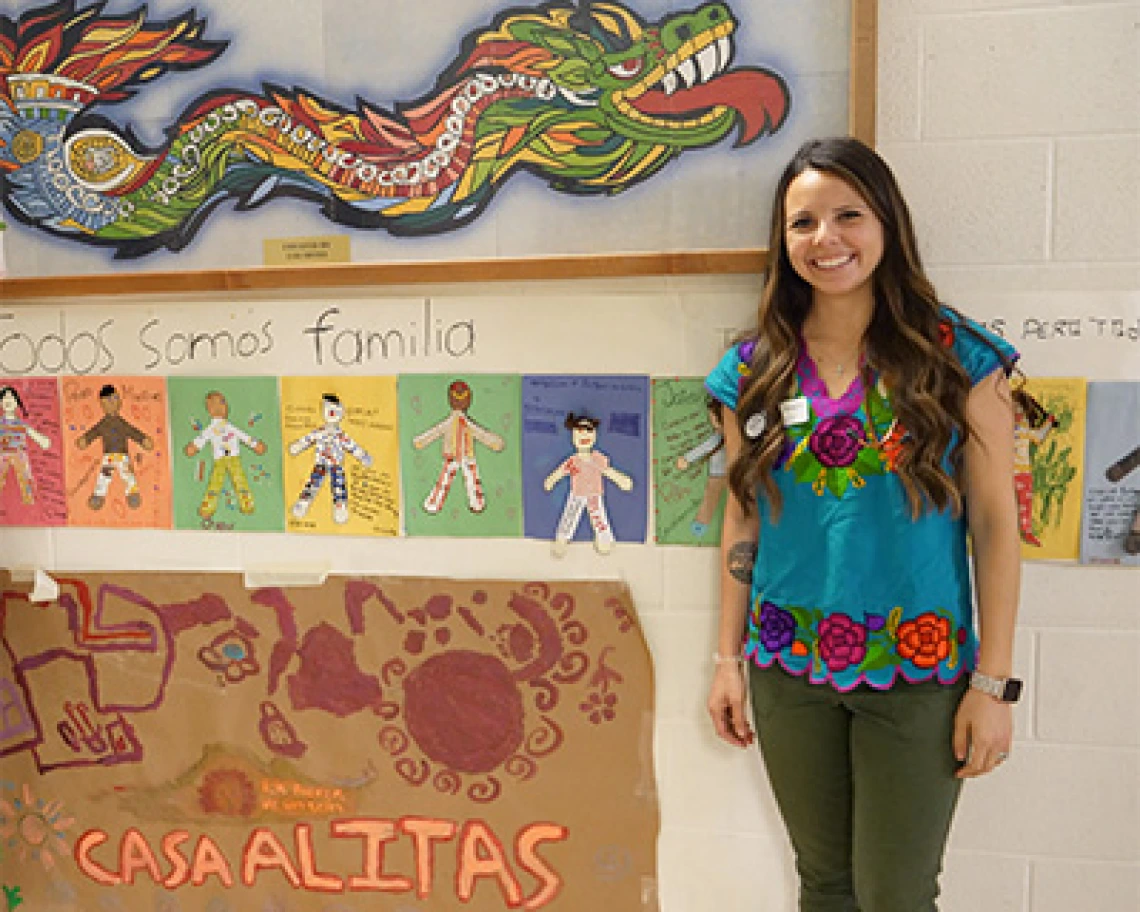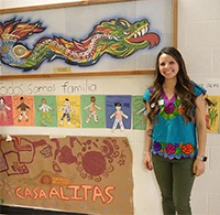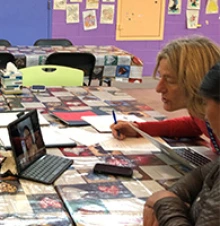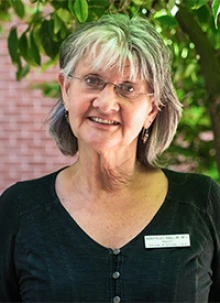UArizona Nursing Students Gain Telehealth Experience During COVID-19 Pandemic
The telehealth certificate program at the University of Arizona College of Nursing provides vital clinical experience for students in the Family Nurse Practitioner program.

TUCSON, Ariz. – As people adapt to social distancing and work-from-home measures due to COVID-19, the importance of telecommunications never has been more critical – especially in health care.

UArizona College of Nursing DNP-FNP student Adriana Warne uses telehealth to conduct remote wellness checks and gain clinical hours otherwise unavailable during the COVID-19 pandemic.
A core component of nursing education is the clinical experience: Students participate in supervised learning sessions in real-world health-care environments, which provide an opportunity to put what they have learned in the classroom into practice.
In the midst of a global pandemic, the telehealth certificate program at the University of Arizona College of Nursing provides clinical experience for its students in the Family Nurse Practitioner Program.
Faculty members at the UArizona College of Nursing are creating innovative education for students and exceptional learning opportunities that place them at no risk. The UArizona nursing telehealth program allows students to learn about the distribution of health-related services and information via electronic information and telecommunication technologies. It fosters long-distance patient and clinician contact, care, advice, reminders, education, intervention and monitoring.

DNP-FNP student Adriana Warne (on screen) conducts a remote wellness check with Guatemalan client and an interpreter.
One such notable program is a partnership with Casa Alitas, a program run by Catholic Community Services of Southern Arizona Inc. that offers short-term shelter to migrants on the beginning stages of their immigration journey. This semester, students began performing well-child assessments on migrant children at the facility with the goal to prepare them to start school when they reach their sponsor’s home city.
Audrey Russell-Kibble, DNP, FNP-C, FAANP, a clinical associate professor, was supervising rotations for students – who would be able to earn their full 90 pediatric clinical hours toward their Doctor of Nursing Practice to Family Nurses Practitioner (DNP-FNP) degrees – when the COVID-19 crisis hit. It quickly became clear for the safety of students, faculty members and patients that the clinical hours would need to be moved online.
Adriana Warne, BSN, RN, a student who has completed 32 of her clinical hours at Casa Alitas, is working on her DNP project to develop a Migrant Well-Child Health Toolkit for the program. She worked with Dr. Russell-Kibble to prepare for the transition to telehealth screenings. Warne began by translating the Casa Alitas Medical Screening Tool into Spanish to prepare for her first remote wellness check. She worked with an intake person to aid with the interview of a mother from Guatemala and her four children and interfaced with interpreters to successfully complete the screening.

Dr. Audrey Russell-Kibble
“The intake person gave Adriana high marks for her respectful and culturally competent gentle manner with the migrant mother and her family,” Dr. Russell-Kibble said.
Referring to the experience as incredible, Warne called the telehealth technology invaluable as students learn how to adapt to assess patients and families during the COVID-19 pandemic.
“Since I already completed in-person clinical time at Casa Alitas for the semester, being able to apply a telehealth approach to clinical care, really brought my clinical experience to another level,” she added. “This opportunity allowed me to use what I learned thus far in my didactic coursework about telemedicine and cultural competency. I also applied what I learned in my clinical work by exercising my clinical judgment without being physically present with the family.”
During the screening, Warne built a rapport with the family by working with two interpreters, one who spoke Mam (an indigenous Mayan language in Guatemala and the Mexican state of Chiapas) and one who was bilingual in English and Spanish. The Mam language interpreter was present at the visit by telephone, but the migrant woman was able to see Warne face-to-face on an iPad furnished by the college.

Dr. Allen Prettyman
“I know this experience will enhance my DNP project, and I can’t thank Casa Alitas and the College of Nursing enough for this unique opportunity to apply this innovative approach to clinical care,” Warne said. “Hopefully, more students will have the opportunity to use telehealth technology, because I have a feeling once everything settles with COVID-19, telemedicine is going to grow exponentially and become a more common approach to clinical practice.”
Allen Prettyman, PhD, FNP-BC, FAANP, clinical associate professor and DNP program interim director, added, “This is an excellent example of the College of Nursing overcoming barriers to clinical education during this time of crisis.”
More information on the college’s activities regarding the COVID-19 pandemic are at this link.
The UArizona Health Sciences COVID-19 Resources webpage can be found here.
For the latest on the UArizona response to the novel coronavirus, visit the COVID-19 webpage.
A version of this story appeared originally on the UArizona College of Nursing website.
# # #
NOTE: Photos available upon request.
About the University of Arizona College of Nursing
Established in 1957, the University of Arizona College of Nursing has been transforming nursing education, research and practice to help people build better futures for more than 60 years. Consistently ranked among the best programs in the nation, the college is strengthening health care’s largest workforce and the public’s most trusted profession through its undergraduate and graduate programs, offered online and on-campus in Tucson and Phoenix. Headquartered in Tucson, Ariz., where integrative health has been pioneered, the UA College of Nursing is home to the world’s only Integrative Nursing Faculty Fellowship. With key focal strengths in integrative health, cancer prevention and survivorship, and nursing informatics, the college has more than 7,000 alumni worldwide promoting health and wellness in their workplaces and communities. For more information: nursing.arizona.edu (Follow us: Facebook | Instagram | YouTube | LinkedIn).
About the University of Arizona Health Sciences
The University of Arizona Health Sciences is the statewide leader in biomedical research and health professions training. UArizona Health Sciences includes the Colleges of Medicine (Tucson and Phoenix), Nursing, Pharmacy, and the Mel and Enid Zuckerman College of Public Health, with main campus locations in Tucson and the Phoenix Biomedical Campus in downtown Phoenix. From these vantage points, Health Sciences reaches across the state of Arizona, the greater Southwest and around the world to provide next-generation education, research and outreach. A major economic engine, Health Sciences employs nearly 5,000 people, has approximately 4,000 students and 900 faculty members, and garners $200 million in research grants and contracts annually. For more information: uahs.arizona.edu (Follow us: Facebook | Twitter | YouTube | LinkedIn | Instagram).

